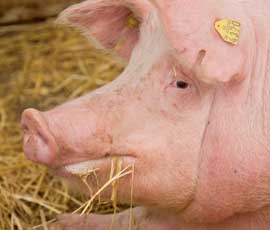Pig slurry power helps cut farm heating bills

Pig slurry is being used to heat farm buildings in Northumberland thanks to a state-of-the-art anaerobic digester.
The £1.2m anaerobic digestion facility with an average electrical output of 75kW is the first to be installed on a working farm in northeast England.
It is part of a major drive by Newcastle University to explore new ways in which agriculture can become more sustainable.
Officially launched this week, the system is already producing heat from the animal dung produced on Cockle Park Farm.
The next step will be to use this heat to keep the pigs warm and to generate electricity to power the milking parlour.
Project leader Paul Bilsborrow, of the School of Agriculture, Food and Rural Development, said the aim was to produce renewable energy from waste.
“Anaerobic digestion offers huge potential in terms of utilizing the methane from animal waste and converting it into renewable,” Dr Bilsborrow explained.
“The plant at Cockle Park provides us with a unique opportunity to demonstrate best practice for integrating this technology within a working mixed farm.
“It is also an important step towards the creation of a ‘Sustainable Farm’, focused on the production and use of renewable energy.
“By working together with the agricultural industry we hope to develop new ways of making anaerobic digestion a viable process for uptake by farms.”
The anaerobic digestion plant is a key part of the University’s new Living Lab concept which places research into sustainability at the heart of the region.
It aims to encourage forward-thinking and innovative approaches to sustainable challenges and providing real solutions both now and in the future.
Anaerobic digestion is a process by which micro organisms break down biodegradable material in the absence of oxygen to produce biogas.
There are now over 50 fully commissioned anaerobic digestion plants across the country with a similar number currently in the planning process.
The project was jointly funded by the University and One North East through its Rural Development Programme for England (RDPE).
The Government released its Anaerobic Digestion Strategy and Action Plan for England last month.
DEFRA minister Lord Henley said: “Green energy from waste on working farms saves money for farmers and is good for the environment.
“Developing these types of innovative and practical solutions is key to moving us along the path to a zero-waste economy.”
• Visit our special section on renewable energy.
